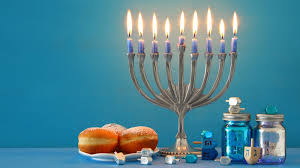
Operation Inspiration
This question has likely been bandied about in your home for weeks already. Whether asked by parents or Bubbies or Zaidies, or Sabas or Savtas, it usually evokes a grimace of concentration from the child as he or she thinks of what to ask for as a Chanuka gift.
It’s reminiscent of the game shows in which the radio announcer or host holds a wallet or box with cash in it and the person has to guess how much is inside. If they’re right or below the number, they get what they asked for but if they’re over they get nothing. The mental anguish involved in this stressful moment of decision is almost palpable. Such is the dilemma of the child.
Ask for something in the price range the questioner has in mind and you will get what you want. Get a little too greedy and you will end up with socks and a book. But this idea is not just stressful for the recipient. Giving Chanuka presents is also a very stressful affair.
You want to make sure it’s something they will like, that they don’t already have, and that will be appreciated. Over the years, I’ve figured out just what my wife likes. It’s essentially whatever I haven’t given her. Usually when I buy her Chanuka presents I tell her I bought them and then just keep them in my car so it’s easy for me to return them.
That’s why people ask, so they avoid the uncomfortable situation of the recipient opening the gift with great excitement only to have their face twist into an unnatural smile as they try to compliment it by saying something like, “Oh – it’s so… unique. I never would have thought of buying this for myself…”
Rather than that question, I’d like to ask another one. Not “What do you want for Chanuka this year,” but, “What did you get for Chanuka last year? How about the year before that?” If you can’t answer the question, then likely the things you got weren’t as important to your life as you thought.
Though your child thought she couldn’t live without that doll, or car, or dress, or whatever it was, a year later it’s not in her frame of reference. Obviously, Chanuka gifts are not as important as we might be led to believe. However, this year I finally realized WHY gift-giving has become so big.
It’s not because the toy companies spend so much money on advertising and it’s not because the latest game, gadget or gizmo is so life-changing. There’s actually a spiritual reason for the phenomenon of gifts. But we’ll get to that in a second. Let me ask you: Why do we light the menorah?
What do you mean it’s obvious? Ok, yes, the Jews in ancient times lit candles in their courtyards and there was a miracle of oil lasting for eight days. But is that the REAL reason we light them? I’ll give you a hint: you say the answer every day.
In Haneiros Halalu, the first song we sing upon kindling the Menorah, we discuss how these lights are not kindled to be used for light but rather we are to simply look at them: k’dai l’hodos u’lhallel, in order to thank and praise Hashem for his wonders, miracles and salvations. Those last three words are plural, because we’re not just thanking Hashem for the miracle of Chanuka but for His constant protection, kindness, and deliverance. This is why we light the Menorah.
When we look at the fires burning, let’s take a page out of R’ Chanina ben Dosa’s book. When his daughter accidentally filled the Shabbos lamps with vinegar, he told her, “The same G-d Who decreed that oil should burn can decree that vinegar can burn,” and so it did!
The flames, 36 of them if you don’t count the Shamash candle, allude to the 36 hours during which Man enjoyed the light of Creation until he was sent from the Garden of Eden after the first Shabbos. They contain the hidden light of Creation and by gazing into them we can see with this holy light. It’s the light that teaches us that all things and occurrences in the world are part of the miraculous doings of Hashem and that what we perceive as miracles are no more special than what we perceive as nature.
On Chanuka, what we really want is to be able to appreciate all that Hashem does for us which we too often take for granted, and THAT’S why I think He made gifts a part of the holiday.
It is a way to train ourselves to say “Thank you!” It is a way to focus on the fact that we don’t deserve all that we have been blessed with. It is a time to say, “All I want for Chanuka is to appreciate the gifts I’ve already been given.”
© 2019 – All Rights Reserved
Did you enjoy this column? Feedback is welcome and appreciated. E-mail info@JewishSpeechWriter.com to share your thoughts. You never know when you may be the lamp that enlightens someone else.